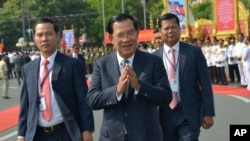Prime Minister Hun Sen called on judicial and court officials to release former opposition officials and activists who had been charged for being part of opposition leader Sam Rainsy’s attempted return last week.
Speaking in Kampot on Thursday, Hun Sen called for courts to grant bail to around 70 people arrested in the run up to Sam Rainsy’s attempted return to Cambodia. These activists and former party officials had been arrested for allegedly helping Sam Rainsy mount a coup – which is how the government had characterized the opposition’s attempted return to the country.
Hun Sen’s announcement comes days after the European Union Commission submitted its initial findings on potentially suspending the ‘Everything But Arms’ trade privileges, which would lend a major blow to the Cambodian economy.
Radio Free Asia (RFA) on Thursday accessed a leaked copy of the confidential report, where the commission points to a further deterioration of Cambodia’s human rights record since the review was initiated in February.
‘’Official sources who had access to the much-awaited report, which was marked "sensitive," shared it with RFA on condition of anonymity,’’ the story read on the main RFA website.
The prime minister said the arrested, former CNRP officials should be released from prison on bail, and that those who had fled the country should return without fear of being arrested.
“The ones who don’t have court warrants and just feel scared, please come back,” he said. “Nobody will touch you.”
He told CNRP officials, who had left the country out of fear of persecution, that they could reach out to him on Facebook if they were arrested on return, a rare gesture of outreach by the premier.
As of Thursday evening, VOA Khmer could confirm that two arrested CNRP officials from Kampong Thom province, Sun Bunthun and Nou Phoeun, had been released on bail.
“It was unfair to imprison them in the past,” said Sun Thun, former CNRP official and Sun Bunthun’s brother. “It is a politically motivated case.”
However, as Hun Sen directed court officials to release CNRP activists on Thursday, it was in contradiction to his government’s claims earlier this week that they couldn’t instruct the court to release or drop the charges against opposition leader Kem Sokha.
On Sunday, a Phnom Penh court altered the bail conditions for Kem Sokha, allowing him to travel within the country and effectively ending his house arrest.
But, foreign governments and rights groups called for the treason charges to be dropped and for Kem Sokha to be released. In response, the government said it could not interfere in the independence of the court.
Political analyst Lao Mong Hay said Hun Sen’s directive showed that the courts were not independent and susceptible to political control.
“It’s another example and another testimony that our Mr. Samdech Techo Prime Minister has influence on the judiciary. So, the judiciary is not independent,” he said.
Justice Ministry spokesperson Chin Malin instead characterized Hun Sen’s directive as a request from the executive and that it was up to the court to take an independent decision. He added that the request was in no way linked to the EU Commission’s report on Cambodia’s human rights record.
“[Hun Sen’s] request to the court is not interference,” he said. “It is a request in his capacity the head of executive branch, but it is for the court to make its own decision.”
Additional Reporting By Sun Narin




